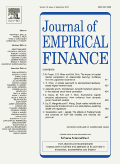
Journal of Empirical Finance
Scope & Guideline
Exploring the empirical foundations of global economies.
Introduction
Aims and Scopes
- Empirical Analysis of Financial Markets:
The journal emphasizes studies that apply empirical methods to analyze various aspects of financial markets, including stock prices, volatility, and market efficiency. - Risk Management and Asset Pricing:
Research on risk assessment, management strategies, and asset pricing models is a core focus, contributing to the understanding of how risks are priced in different markets. - Corporate Finance and Governance:
The journal publishes studies that explore corporate governance, tax strategies, and the financial implications of managerial decisions, providing insights into firm behavior. - Machine Learning and Financial Forecasting:
There is a growing interest in applying machine learning techniques for financial forecasting, improving predictive accuracy and enhancing decision-making in finance. - International Finance and Market Dynamics:
The journal covers international finance topics, examining how global events and policies affect local markets and investment strategies. - Behavioral Finance Insights:
Research that incorporates behavioral aspects of finance, such as investor sentiment and decision-making biases, is also a significant area of interest.
Trending and Emerging
- Machine Learning Applications in Finance:
There is a significant uptick in studies utilizing machine learning techniques for asset pricing, risk management, and forecasting, highlighting the integration of advanced analytics into financial research. - Sustainability and ESG Factors:
Research exploring Environmental, Social, and Governance (ESG) factors and their impact on investment performance and corporate behavior is gaining popularity, reflecting growing investor interest in sustainability. - Cryptocurrency and Blockchain Analysis:
The rise of cryptocurrencies has led to increased research on their market dynamics, pricing mechanisms, and implications for traditional finance, indicating a shift towards digital assets. - Behavioral Finance and Investor Psychology:
Emerging studies are focusing more on behavioral finance, examining how psychological factors influence market behavior and investment decisions, providing deeper insights into market anomalies. - Impact of Policy Changes on Financial Markets:
Research analyzing the implications of regulatory changes, monetary policy shifts, and economic uncertainty on market behavior is trending, reflecting the importance of policy in financial dynamics.
Declining or Waning
- Traditional Asset Pricing Models:
There has been a noticeable decrease in research focused solely on traditional asset pricing models without empirical innovations, suggesting a shift towards more complex, data-driven methodologies. - Static Risk Metrics:
Studies relying on static measures of risk, such as simple volatility calculations, have become less frequent, as researchers increasingly adopt dynamic and multifactor approaches. - Localized Market Studies:
Research focusing exclusively on localized markets without consideration of global interconnectedness is waning, reflecting a broader trend towards examining cross-border implications. - Historical Financial Analysis:
While historical financial analysis remains relevant, there is a declining emphasis on purely historical studies, with more focus shifting to real-time data analytics and machine learning techniques. - Conventional Fund Performance Studies:
Standard studies on mutual fund performance based on traditional metrics are becoming less common, as the field moves towards more nuanced analyses involving behavioral and psychological factors.
Similar Journals
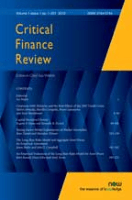
Critical Finance Review
Shaping the future of finance through high-quality research.Critical Finance Review is a premier academic journal dedicated to advancing the field of finance through the publication of high-quality research that spans various dimensions of the discipline. Published by NOW PUBLISHERS INC, this journal has quickly established itself as a leading source of innovative finance scholarship, achieving a notable Q1 classification in the 2023 finance category. Operating under a rigorous peer-review process, the journal ensures the academic integrity and relevance of its content, which attracts contributions from both emerging and established scholars. With an ISSN of 2164-5744 and E-ISSN 2164-5760, it is accessible to a global audience, though it operates under traditional access models. The journal welcomes a diverse range of topics including, but not limited to, risk management, financial markets, and quantitative finance, making it an essential resource for researchers, professionals, and students who are keen to explore the complexities of financial systems and develop new insights in the ever-evolving landscape of finance. Based in the United States, Critical Finance Review holds a significant position within the academic community, fostering a collaborative environment that encourages innovative thinking and practical applications of financial theories.
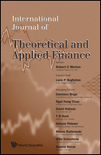
International Journal of Theoretical and Applied Finance
Advancing finance through innovative research.International Journal of Theoretical and Applied Finance is a distinguished publication in the field of finance, serving as a critical platform for the dissemination of innovative research and theoretical insights since its inception in 2003. Published by World Scientific Publishing Co Pte Ltd in Singapore, this journal boasts an impressive Q2 ranking in the realms of Economics, Econometrics, and Finance (miscellaneous) and a solid Q3 status in Finance for 2023. With a commitment to advancing knowledge in the complex world of theoretical frameworks and applied financial practices, it welcomes original research articles, comprehensive reviews, and case studies that explore varied facets of finance. Researchers, professionals, and students benefit from the journal's rigorous peer-review process and an ever-expanding repository of knowledge, making it an indispensable resource in the financial academic community. The journal does not currently offer open access, reflecting its selective approach to publishing high-quality content aimed at a specialized audience.
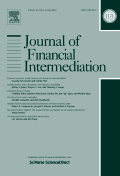
JOURNAL OF FINANCIAL INTERMEDIATION
Exploring the dynamics of finance and markets.JOURNAL OF FINANCIAL INTERMEDIATION, published by Academic Press Inc Elsevier Science, is a premier academic journal dedicated to the study of financial intermediation. First established in 1990, this esteemed journal has firmly positioned itself within the top quartile (Q1) of rankings in both Economics and Econometrics as well as Finance, reflecting its significant impact and relevance in the field. With an impressive Scopus ranking of #31 out of 317 in Finance and #74 out of 716 in Economics and Econometrics, it caters to a diverse audience, including researchers, professionals, and students interested in the intricate dynamics of financial markets and institutions. While the journal does not currently offer open access, it remains a vital resource for disseminating cutting-edge research and insights that drive innovation and inform policy-making in the financial sector. With a commitment to maintaining high academic standards, the JOURNAL OF FINANCIAL INTERMEDIATION continues to serve as an essential platform for advancing knowledge in financial theories and practices.
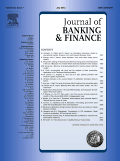
JOURNAL OF BANKING & FINANCE
Elevating Academic Discourse in Finance and EconomicsWelcome to the Journal of Banking & Finance, a premier publication in the fields of finance and economics, expertly published by Elsevier. With its esteemed Q1 ranking in both the Economics and Econometrics and Finance categories for 2023, this journal frequently garners significant attention from researchers, professionals, and academics alike. Established in 1977, it has become a crucial resource for the latest research and advancements in banking and financial services, influencing policies and practices on a global scale. The journal's commitment to high-quality, peer-reviewed content ensures that it not only contributes to academic discourse but also drives real-world financial innovation. As part of the respected Elsevier publishing collection, the journal's rigorous standards and comprehensive analysis serve as indispensable tools for those seeking to understand and navigate the complexities of the financial landscape. Located in the Netherlands, the Journal of Banking & Finance continues to play a vital role in shaping the future of financial research through its impactful insights and research contributions.

European Journal of Finance
Pioneering research that informs financial practice.European Journal of Finance is a prestigious publication specializing in the domains of finance, economics, and econometrics, published by Routledge Journals, Taylor & Francis Ltd. Established in 1995, this journal has become a vital resource for researchers, practitioners, and students, contributing significantly to the understanding of financial systems and markets. With its Q1 ranking in the Economics, Econometrics and Finance category, it stands out for its rigorous peer-reviewed articles that explore innovative theories, models, and empirical studies. The journal's impressive Scopus ranking of 35 out of 242 highlights its impact and relevance within the field, with an 85th percentile standing that underscores its importance to current financial research. Although it does not offer open access, the European Journal of Finance remains a cornerstone for those seeking to delve deeper into the complexities of finance, equipped with insights that drive both academic inquiry and practical application.
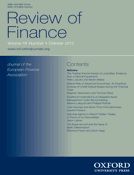
Review of Finance
Driving innovation in financial research and practice.The Review of Finance, published by Oxford University Press, stands as a premier academic journal in the fields of Finance, Accounting, and Economics. With an ISSN of 1572-3097 and an impressive track record stretching from 2001 to 2024, this journal is consistently recognized for its high-quality research, reflected in its Q1 rankings across key categories, including Accounting, Finance, and Economics and Econometrics. The Review of Finance is dedicated to advancing the understanding of financial phenomena through robust empirical and theoretical insights, making it an essential resource for researchers and professionals alike. Additionally, its strong Scopus rankings, placing it in the top percentiles, highlight its influence and relevance in ongoing academic discourse. Although the journal is not open access, it remains widely accessible through academic institutions, ensuring that its valuable contributions reach an extensive audience. The editorial board invites submissions that promise to further engage the academic community in the dynamic intersections of finance, accounting, and economic research.

Review of Pacific Basin Financial Markets and Policies
Illuminating the Dynamics of Pacific Basin FinanceThe Review of Pacific Basin Financial Markets and Policies is a prominent academic journal dedicated to exploring the dynamic landscape of financial markets and policies within the Pacific Basin region. Published by World Scientific Publishing Co. Pte Ltd and based in Singapore, this journal serves as a vital platform for researchers, professionals, and students interested in the intricacies of finance and economics. With an ISSN of 0219-0915 and E-ISSN 1793-6705, it encompasses a broad scope addressing critical issues and emerging trends from 2003 to 2024. Despite its current positioning within the Q4 quartile for both Economics and Econometrics as well as Finance, the journal fosters invaluable contributions that encourage scholarly communication and innovation. Access to the journal is through various academic libraries and institutions, providing an essential resource for those seeking to enhance their understanding of the financial frameworks in the Pacific region.
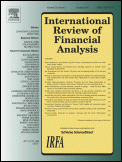
International Review of Financial Analysis
Fostering a community of thought leaders in finance.The International Review of Financial Analysis, published by Elsevier Science Inc, is a premier journal dedicated to advancing the fields of finance and economics. With an impressive impact factor and ranked in the top quartile (Q1) of both Economics and Econometrics and Finance categories, this journal is recognized for its high-quality research and significant contributions to the discipline. Since its inception in 1992, it has provided a platform for scholars to present innovative theories and empirical studies that address critical financial issues around the globe, making it a vital resource for researchers, professionals, and students alike. Although it does not offer open access, the journal actively engages with contemporary debates in financial analysis, ultimately empowering its readership to contribute to and benefit from the ongoing discourse. With its convergence of financial research and analytical methodologies through 2024, the International Review of Financial Analysis remains a cornerstone in the pursuit of knowledge within the ever-evolving landscape of finance.
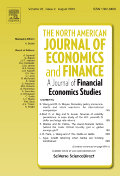
North American Journal of Economics and Finance
Driving innovation through impactful research.The North American Journal of Economics and Finance is a premier academic journal published by Elsevier Science Inc. since 1992, dedicated to advancing the field of economics and finance through rigorous research and scholarship. With an impressive impact factor and recognition in the Q2 category for Economics and Econometrics and Q1 for Finance as of 2023, this journal holds a significant position in the academic community, ranked #41 out of 317 in Finance and #100 out of 716 in Economics. The journal features high-quality, peer-reviewed articles that cover a broad range of topics, from theoretical frameworks to empirical analyses and practical applications. Though not an open-access platform, the journal provides valuable insights for researchers, practitioners, and students alike, promoting knowledge dissemination in the dynamic landscape of economic and financial studies. With its commitment to excellence, the North American Journal of Economics and Finance serves as an essential resource for those seeking to deepen their understanding of contemporary issues in these critical fields.

Journal of Investment Strategies
Shaping the Future of Finance with Strategic InsightsThe Journal of Investment Strategies, published by INCISIVE MEDIA, is a distinguished periodical focusing on pivotal issues within the realms of economics, finance, and management. With the ISSN 2047-1238 and E-ISSN 2047-1246, this journal has been making strides since its inception, presenting innovative research from 2018 to 2024. Designated in the Q2 category for both Economics, Econometrics and Finance and Strategy and Management as of 2023, it exemplifies its role as a crucial platform for scholars and practitioners who aim to disseminate knowledge and innovative strategies in investment. Although currently not open access, it provides robust insights into finance advocacy, economic dynamics, and strategic management practices. Researchers, professionals, and students alike can benefit from the journal's high-quality contributions that stimulate discussions and advance the understanding of complex investment landscapes, making it an essential resource in the pursuit of excellence in these competitive fields.